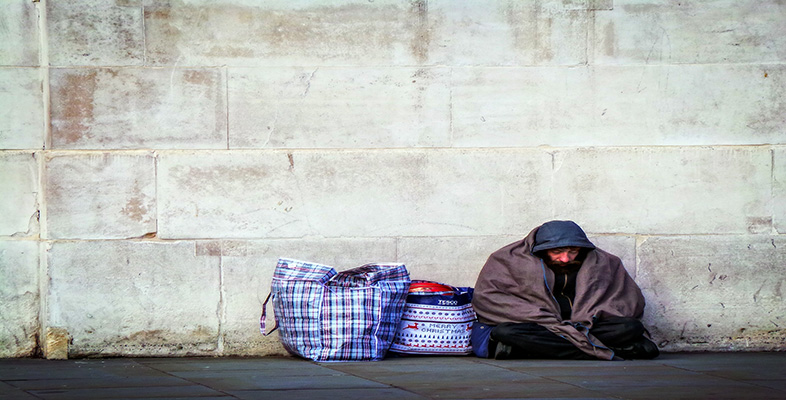7.2 The institutionalisation of discourses
We can see discourses as ways of organising knowledge. They define what the problem is; they say what is worth knowing and what can be said. They produce the ‘norms’ against which deviation or abnormality is marked (the norm of ‘not being poor’, for example). But discourses are not just about words. Discourses shape and become institutionalised in social policies and the organisations through which they are carried out. This is not just a matter of the big policy ideas – the pressure to ‘do something about poverty’ – but also the minute arrangements by which ‘something is done’. Let us give some more examples about poverty and how the discourse of poverty has been institutionalised.
-
Poor people have to prove that they are poor. The systems of doing something about poverty – what in the nineteenth century used to be called providing ‘poor relief – have always involved various sorts of tests that poor people have to pass to prove their need. For example, there have been availability for work tests, in which the poor must prove that they are ready to help themselves by taking work if it is available. There have been means tests, assessing household income to see that it falls below the agreed line at which benefits will be paid. There have also been morality tests – mainly directed at women – which examine whether they are cohabiting and thus potentially dependent on a man's income.
-
Poor people must present themselves as poor. They are ‘claimants’ – an inferior and dependent social status, asking for something from society. Many social benefits go unclaimed, partly for reasons of access to information about them, but also partly because of the stigma (the social taint) of being a claimant. Once people place themselves within the discourse of poverty, their identity is defined in its terms. They are positioned as ‘subjects’ within it – that is, they are themselves subjects of the discourse and understand their own position through it.
-
Poor people have things done to them. Being poor is to be placed in a position where other people have rights over you. Society's institutional arrangements have sometimes focused on segregating the poor – putting them in workhouses, for example – to keep them away from the rest of ‘us’. Sometimes they have been concerned to normalise the poor – giving lessons in budgetary management, good housekeeping, or parenting – with the aim of making ‘them’ more like ‘us’. At other times the emphasis has been on maintaining surveillance on the poor – monitoring their behaviour to make sure that they behave ‘properly’. Although different policies on poverty aim to do different things, they are framed by the discourse of poverty in that they see poor people as the objects of policy – people to whom things are done (often ‘in their own best interests’).
Discourses in this sense are also about relations of power. They organise positions and places in a field of power. So, in relation to poverty, they empower (give power to) state agencies to monitor, assess or intervene in the lives of poor people. They empower some agencies (both state and voluntary agencies) to evaluate the ‘worth’ or ‘desert’ of poor people before benefits or services are provided. Discourses may also – conditionally – empower or give power to poor people. Poor people may be ‘enabled’ to look for work, to take courses, to receive extra benefits, to keep their children, so long as they prove that they are the ‘right sort’ of poor people.
Activity 9
Extract 1 is a document produced by the Charity Organisation Society, a nineteenth-century voluntary organisation which offered ‘relief’ to poor people who met its criteria. What view of poverty and poor people does it represent?
Extract 1 Charity Organisation Society: ‘Notice to persons applying for assistance’
-
The Society desires to help those persons who are doing all they can to help themselves, and to whom temporary assistance is likely to prove a lasting benefit.
-
No assistance should be looked for without full information being given in order that the Committee may be able to judge:
-
Whether the applicant ought to be helped by charity.
-
What is the best way of helping them …
-
-
Persons wishing to be assisted by loans must find satisfactory security, such as that of respectable householders … Loans must be paid back by regular instalments.
-
Persons who have thrown themselves out of employment through their own fault ought not to count on being helped by charity.
-
Persons of drunken, immoral or idle habits can not expect to be assisted unless they can satisfy the Committee that they are really trying to reform.
-
The Society does not, unless under exceptional circumstances, give or obtain help for the payment of back rent or funeral expenses. But when help of this sort is asked for, there may be other and better ways of assisting.
-
Assistance will not, as a rule, be given in addition to a Parish allowance.
Discussion
The emphasis of the COS regulations is relatively clear, making a fundamental distinction between the deserving and undeserving poor. Help will be given to those who ‘are doing all they can to help themselves’. Those who have ‘drunken, immoral or idle habits’ will not receive assistance. In other words, the emphasis is overwhelmingly placed on the individual characteristics of poor people, and assistance is provided only to those who can be helped out of temporary difficulties, where ‘temporary assistance is likely to prove a lasting benefit’. Within the discourse of the COS, it is not possible to view poverty as an endemic feature of society, a consequence of social and economic structures which foster inequality. Poor people become positioned as supplicants, whose own behaviour explains their poverty.

